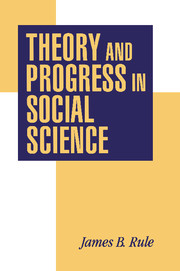Introduction: Progress: Formal and substantive
Published online by Cambridge University Press: 05 November 2011
Summary
Anyone who delves deeply into the literatures of theoretical social science must eventually sense that the reach of our disciplines exceeds their grasp.
On the one hand, the concerns that impel people to reflect on social life have unmistakable validity. People are moved to understand the dynamics of war and peace. People yearn to comprehend the causes of economic growth and stagnation. People want to grasp the processes by which human personality is formed. People seek to comprehend the forms taken by social inequality, and their relations to other social conditions and arrangements. People want to understand the origins of deviance, or of the causes of civil upheaval, or of the changes in family structure now sweeping the world. And on and on.
There is nothing mysterious about the reasons for such concerns. They arise directly from the realization that the forces and processes implicated in them matter for widely shared human interests. People have no choice but to act in response to some assessments of these forces or remain at their mercy. They are things that people need to know about in any reflective effort to make the most of social life. Academic social science may sometimes turn away from such concerns. But the result is only to leave them to others to ponder.
Of course, professional social scientists often do strive to address such issues in their work.
- Type
- Chapter
- Information
- Theory and Progress in Social Science , pp. 1 - 20Publisher: Cambridge University PressPrint publication year: 1997



